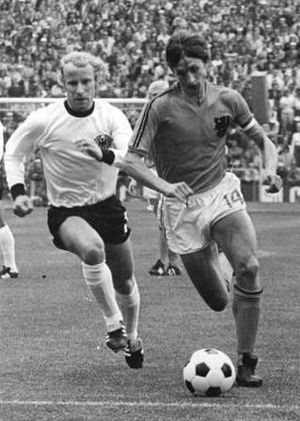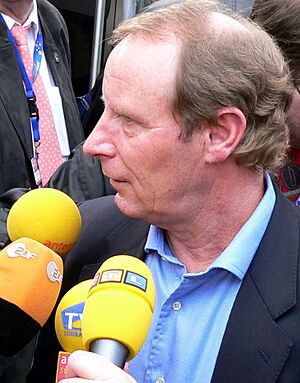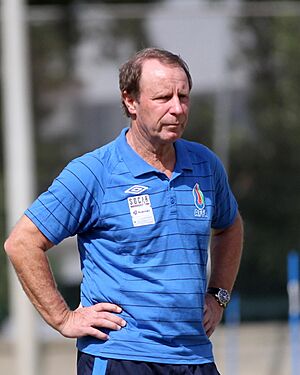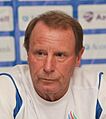Berti Vogts facts for kids
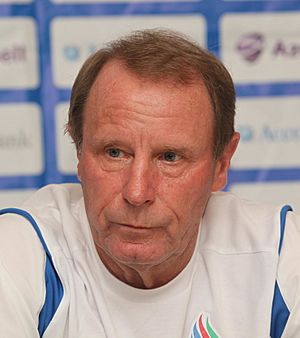
Vogts with Azerbaijan in 2014
|
||||||||||||||||||||||||||||||||||||||||
| Personal information | ||||||||||||||||||||||||||||||||||||||||
|---|---|---|---|---|---|---|---|---|---|---|---|---|---|---|---|---|---|---|---|---|---|---|---|---|---|---|---|---|---|---|---|---|---|---|---|---|---|---|---|---|
| Full name | Hans-Hubert Vogts | |||||||||||||||||||||||||||||||||||||||
| Date of birth | 30 December 1946 | |||||||||||||||||||||||||||||||||||||||
| Place of birth | Büttgen, British-occupied Germany | |||||||||||||||||||||||||||||||||||||||
| Height | 1.68 m (5 ft 6 in) | |||||||||||||||||||||||||||||||||||||||
| Position(s) | Defender | |||||||||||||||||||||||||||||||||||||||
| Youth career | ||||||||||||||||||||||||||||||||||||||||
| 1954–1965 | VfR Büttgen | |||||||||||||||||||||||||||||||||||||||
| Senior career* | ||||||||||||||||||||||||||||||||||||||||
| Years | Team | Apps | (Gls) | |||||||||||||||||||||||||||||||||||||
| 1965–1979 | Borussia Mönchengladbach | 419 | (32) | |||||||||||||||||||||||||||||||||||||
| International career | ||||||||||||||||||||||||||||||||||||||||
| 1967–1978 | West Germany | 96 | (1) | |||||||||||||||||||||||||||||||||||||
| Managerial career | ||||||||||||||||||||||||||||||||||||||||
| 1979–1990 | West Germany U21 | |||||||||||||||||||||||||||||||||||||||
| 1986–1990 | West Germany (assistant) | |||||||||||||||||||||||||||||||||||||||
| 1990–1998 | Germany | |||||||||||||||||||||||||||||||||||||||
| 2000–2001 | Bayer Leverkusen | |||||||||||||||||||||||||||||||||||||||
| 2001–2002 | Kuwait | |||||||||||||||||||||||||||||||||||||||
| 2002–2004 | Scotland | |||||||||||||||||||||||||||||||||||||||
| 2007–2008 | Nigeria | |||||||||||||||||||||||||||||||||||||||
| 2008–2014 | Azerbaijan | |||||||||||||||||||||||||||||||||||||||
| 2015–2016 | United States (technical advisor) | |||||||||||||||||||||||||||||||||||||||
|
Medal record
|
||||||||||||||||||||||||||||||||||||||||
| *Club domestic league appearances and goals | ||||||||||||||||||||||||||||||||||||||||
Hans-Hubert "Berti" Vogts is a famous German former football player and manager. He was born on December 30, 1946. Berti Vogts played as a defender, known for being tough and determined.
He spent his entire club career playing for Borussia Mönchengladbach in Germany. He also played for the West Germany national team. With West Germany, he won the FIFA World Cup in 1974.
After he stopped playing, Vogts became a football manager. He managed the national teams of Germany, Scotland, Nigeria, and Azerbaijan. As manager of Germany, he led the team to win the European Championship in 1996.
Contents
Playing Career
Time at Borussia Mönchengladbach
Berti Vogts started playing football at a young age. He joined the VfR Büttgen club when he was seven years old in 1954. He stayed there until 1965, when he moved to Borussia Mönchengladbach.
He played as a right-back, a defensive position on the field. His strong and persistent style of play earned him the nickname "Der Terrier." This means "The Terrier" in German, like a small, feisty dog that never gives up.
Vogts was a very important player for Borussia Mönchengladbach in the 1970s. This was a "golden age" for the club. During this time, they won the Bundesliga (Germany's top league) five times. They also won the German Cup once and the UEFA Cup twice.
He played in the 1977 European Cup Final against Liverpool, but his team lost that match. Berti Vogts played 419 games in the Bundesliga for Mönchengladbach. He scored 32 goals during his time there. He retired from playing football in 1979, having played only for Mönchengladbach in his professional club career.
Playing for West Germany
Berti Vogts also had a great international career playing for West Germany. He played in 96 international games for the senior team. This makes him one of Germany's most capped players. He was also the captain for 20 of these games.
His nickname "Der Terrier" was also well-known in international matches. He was famous for fighting for every ball. In the final of the 1974 FIFA World Cup in Munich, West Germany, Vogts had a key role. He successfully marked Johan Cruyff, a very famous Dutch player. West Germany won that final 2–1.
In the 1978 FIFA World Cup, Vogts scored an own goal against Austria. This meant Austria won the game, and West Germany could not move to the next round. This match is still remembered in Austria.
Managerial Career
Coaching Germany's National Team
After he stopped playing, Berti Vogts started coaching. He first became the coach for the West Germany under-21 national team. He did this until 1990. Then, he became an assistant manager for the senior national team in 1986.
In August 1990, he became the main manager of the German national team. He took over from Franz Beckenbauer. Under Vogts, Germany reached the final of UEFA Euro 1992, finishing as runner-up. Four years later, he led Germany to win the European Championship in 1996. However, Germany lost in the quarter-finals of the FIFA World Cup in both 1994 and 1998. He left his role as manager in September 1998.
Managing Other Teams
After leaving the German national team, Vogts managed several other clubs and national teams.
Bayer Leverkusen
In November 2000, he became the manager of Bayer Leverkusen. He helped the team qualify for the UEFA Champions League. However, he was sacked in May 2001.
Kuwait
Three months later, in August 2001, he took on the role of manager for the Kuwait national team. He stayed in this position for about six months.
Scotland
In January 2002, Vogts became the manager of the Scotland national team. He led Scotland to a play-off spot for UEFA Euro 2004. They won the first leg against the Netherlands 1–0. But the Netherlands won the second leg 6–0, so Scotland did not qualify.
The Scottish media became quite critical of Vogts after some friendly match defeats. A draw against Moldova in October 2004 made it very hard for Scotland to qualify for the 2006 FIFA World Cup. Vogts resigned on November 1, 2004, due to the strong criticism he received. After he left, Scotland's ranking in the FIFA World Rankings dropped to a very low spot.
Nigeria
In January 2007, Berti Vogts was appointed manager of Nigeria. He signed a four-year contract. Nigeria reached the quarter-finals of the 2008 African Nations Cup. This was their worst performance in the competition since 1982. Vogts resigned from this role in February 2008.
Azerbaijan
In April 2008, he became the manager of Azerbaijan. He extended his contract several times due to some good results. In March 2014, he also became a special advisor to the United States for the 2014 FIFA World Cup.
In October 2014, he resigned as Azerbaijan manager. This happened after a big 6–0 loss against Croatia. Azerbaijan had lost all of their first three matches in the Euro 2016 qualifiers. Vogts faced a lot of criticism from local fans and the media because of the team's poor results.
United States
In March 2015, Vogts officially joined the United States national team as a technical advisor. His time with the team ended when Jürgen Klinsmann, the head coach, was dismissed.
Honours and Achievements
Berti Vogts achieved many great things as both a player and a manager.
As a Player
With Borussia Mönchengladbach:
- Bundesliga (German League): 1969–70, 1970–71, 1974–75, 1975–76, 1976–77 (five times)
- DFB-Pokal (German Cup): 1972–73
- UEFA Cup: 1974–75, 1978–79 (twice)
With West Germany:
- FIFA World Cup: 1974
- UEFA European Championship: 1972
Individual Awards:
- He was named in the kicker Bundesliga Team of the Season many times.
- He was named Footballer of the Year (Germany) in Germany in 1971 and 1979.
- He was part of the FIFA World Cup All-Star Team in 1974 and 1978.
As a Manager
With Germany:
Individual Awards:
- He was named World Soccer Magazine World Manager of the Year in 1996.
Images for kids
See also
 In Spanish: Berti Vogts para niños
In Spanish: Berti Vogts para niños
 | Sharif Bey |
 | Hale Woodruff |
 | Richmond Barthé |
 | Purvis Young |


